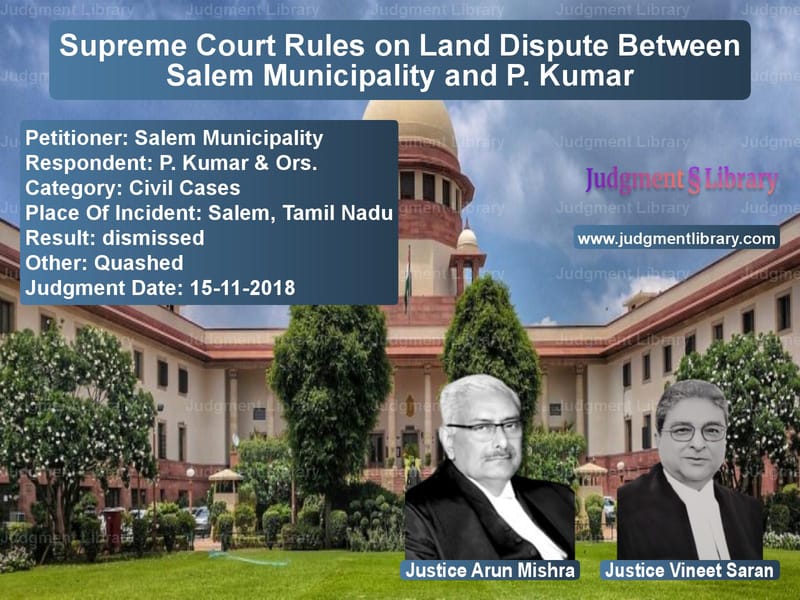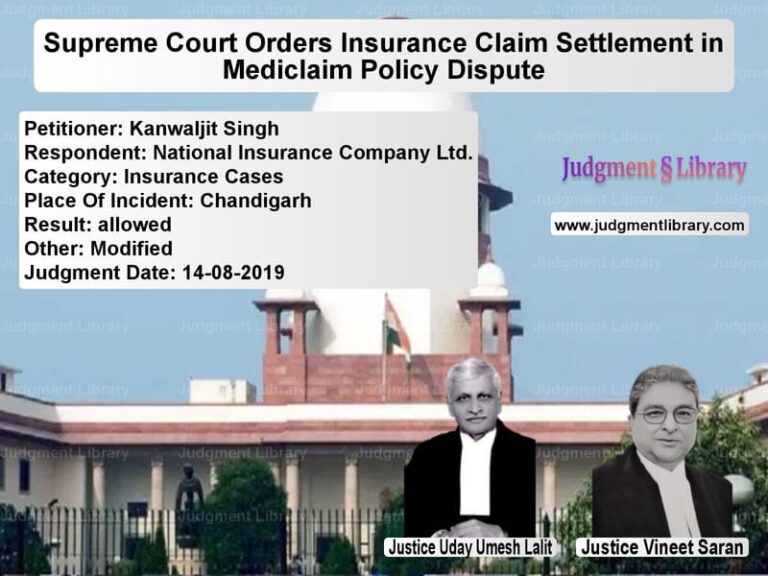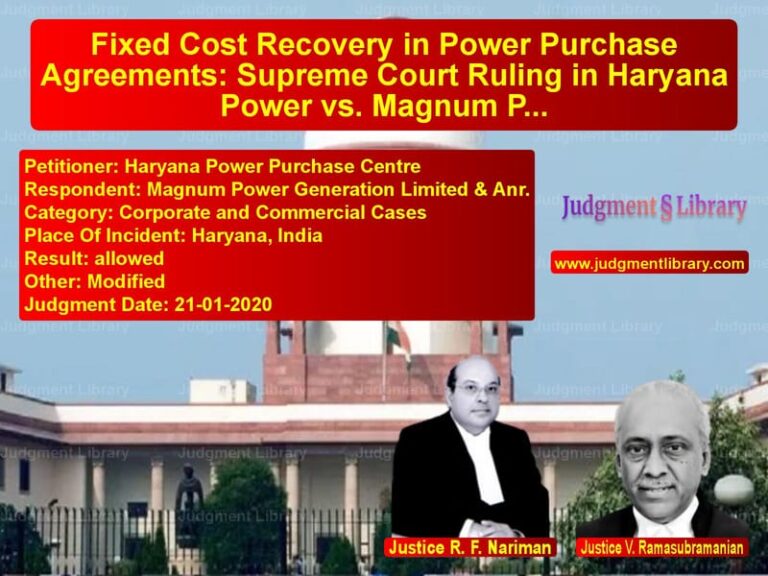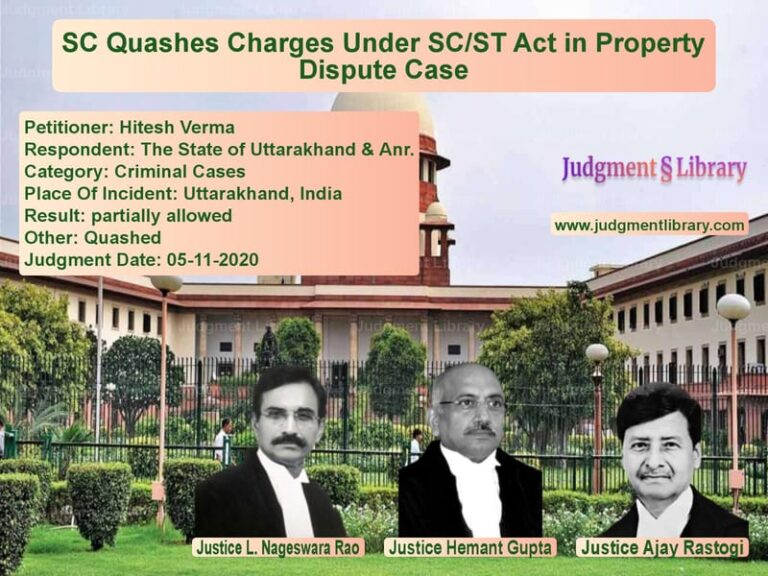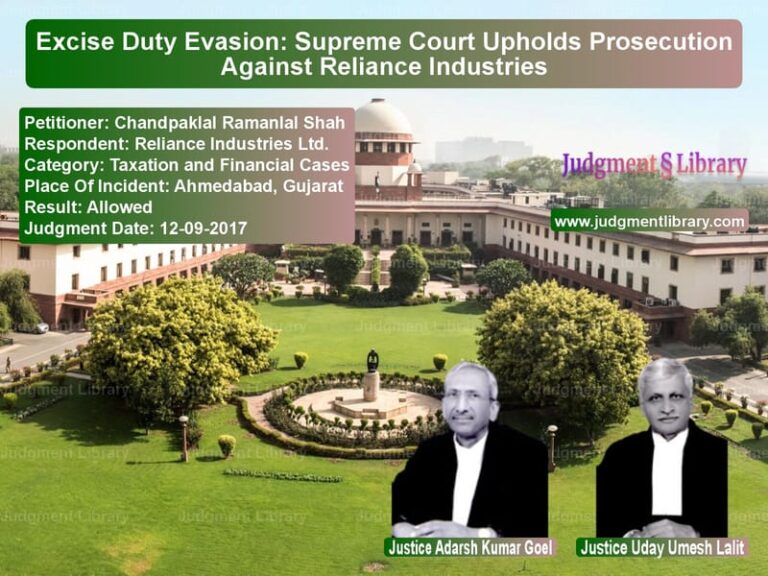Supreme Court Rules on Land Dispute Between Salem Municipality and P. Kumar
The case of Salem Municipality v. P. Kumar was a significant ruling by the Supreme Court that dealt with land disputes, ownership claims, and municipal property rights. The dispute revolved around the ownership of a piece of land classified as poramboke land, which was allegedly in possession of the respondent, P. Kumar. The Supreme Court’s judgment reaffirmed the principle that public lands, especially those classified as government property or water bodies, cannot be claimed through adverse possession or illegal occupation.
Background of the Case
The dispute in question involved a plot of land in Salem, Tamil Nadu, that was claimed by P. Kumar and his predecessors based on alleged long-term possession. The land had originally belonged to the erstwhile zamindari system before being vested in the State of Tamil Nadu under the Tamil Nadu Estates (Abolition and Conversion into Ryotwari) Act, 1948. The respondent, Kumar, claimed ownership rights based on leases that were granted to his predecessors. However, the municipality contested this claim, arguing that the land was classified as poramboke, meaning it was reserved for public use and could not be owned privately.
Legal Issues
- Whether the respondent, P. Kumar, had valid ownership or possessory rights over the disputed land.
- Whether the land, which had been classified as government poramboke, could be claimed under private ownership.
- Whether the respondent’s application for ryotwari patta should have been granted.
- Whether the municipality had the authority to reclaim and manage the land for public purposes.
Arguments Presented
Petitioner’s (Salem Municipality) Arguments
- The land in question was classified as poramboke and, therefore, could not be privately owned.
- As per the revenue records and land classification laws, the land had always been considered government property.
- The applications for ryotwari patta were repeatedly rejected, reinforcing that no private ownership existed.
- The municipality had authority over the land and had a duty to reclaim it for public use.
Respondent’s (P. Kumar) Arguments
- The respondent claimed that the land had been in continuous possession by his family for several decades.
- The lease agreements granted to his predecessors were valid and entitled him to ownership rights.
- He argued that he had applied multiple times for ryotwari patta, which should have been granted based on long-term possession.
- He contended that the municipality had acted arbitrarily in denying his rights to the land.
Key Observations by the Supreme Court
The Supreme Court extensively examined the legal principles governing public land, municipal property, and the Tamil Nadu Estates Abolition Act. The following key observations were made:
“The classification of the land as poramboke indicates that it was always meant for public purposes and could not be alienated for private use.”
“The continuous rejection of ryotwari patta applications reinforces that the respondent had no legal claim to ownership.”
“The High Court erred in granting relief to the respondent when the municipal records clearly indicated the land belonged to the government.”
Final Judgment
- The Supreme Court ruled in favor of Salem Municipality, upholding the classification of the land as poramboke.
- The High Court’s ruling in favor of P. Kumar was overturned, and his ownership claims were dismissed.
- The municipality was directed to ensure that the land remains designated for public use.
- A penalty of ₹1 lakh was imposed on the respondent for repeated litigation and frivolous claims.
Implications of the Judgment
- Reaffirmation of Public Land Protection: The ruling establishes that government land classified as poramboke cannot be acquired through possession claims.
- Clarification on Ryotwari Patta: The judgment reinforces that patta applications must be legally valid and supported by historical ownership records.
- Precedent for Municipal Authorities: The decision strengthens the authority of municipalities in reclaiming and managing public land.
Conclusion
The Supreme Court’s ruling in Salem Municipality v. P. Kumar is a landmark decision that upholds the sanctity of government land classification. By ruling in favor of the municipality, the Court has reinforced the principle that public land cannot be acquired through adverse possession or long-term occupation without legal sanction. This judgment serves as an important precedent for similar disputes, ensuring that government land remains protected for public welfare.
Petitioner Name: Salem Municipality.Respondent Name: P. Kumar & Ors..Judgment By: Justice Arun Mishra, Justice Vineet Saran.Place Of Incident: Salem, Tamil Nadu.Judgment Date: 15-11-2018.
Don’t miss out on the full details! Download the complete judgment in PDF format below and gain valuable insights instantly!
Download Judgment: Salem Municipality vs P. Kumar & Ors. Supreme Court of India Judgment Dated 15-11-2018.pdf
Direct Downlaod Judgment: Direct downlaod this Judgment
See all petitions in Property Disputes
See all petitions in Landlord-Tenant Disputes
See all petitions in Specific Performance
See all petitions in Judgment by Arun Mishra
See all petitions in Judgment by Vineet Saran
See all petitions in dismissed
See all petitions in Quashed
See all petitions in supreme court of India judgments November 2018
See all petitions in 2018 judgments
See all posts in Civil Cases Category
See all allowed petitions in Civil Cases Category
See all Dismissed petitions in Civil Cases Category
See all partially allowed petitions in Civil Cases Category

